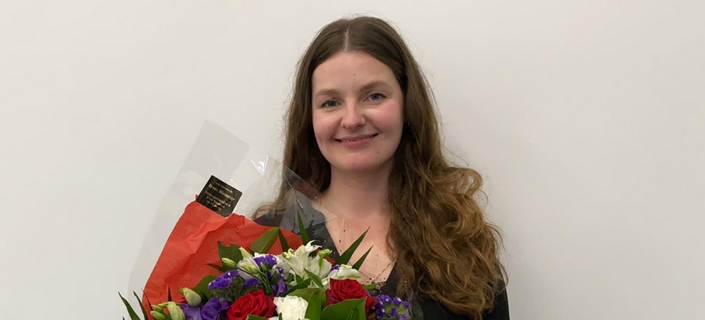
Hósdagin 30. september vardi Katla Heðinsdóttir ph.d.-ritgerð sína við Institut for Kommunikation á Københavns Universiteti.
Verjan gekk sera væl, og metingarfólkini spardu ikki uppá lýsingarorðini: Framúrskarandi, frálíkt filosofiskt arbeiði, sera týðandi gransking. Ein av próvdómarunum endaði við at bjóða henni við í ein granskingarbólk í Oslo.
Verkætlanin snýr seg um úrnýtslu og viðbrekni í kliniskari gransking við denti á gransking í fíggjarliga viðkvomum umhvørvum. Heitið á ritgerðini er: “On the Exploitation of Host Communities in International Clinical Research."
Granskingin hjá Katlu Heðinsdóttier er partur av stórari granskingarverkætlan við heitinum “Convergent Ethics and Ethics of Controversy - (CEEC)” har fleiri granskarar kanna alment ivasemi mótvegis nýggjari biotøkni úr etiskum, sálarfrøðiligum og politiskt-filosofiskum sjónarhornum.
Klemens Kappel, professari á Københavns Universitet, hevur verið høvuðsvegleiðari og Erik Malmqvist, lektari á Göteborgs Universitet, hjávegleiðari
Í metingarnevndini vóru
Sabrina Ebbersmeyer, lektari á Københavns Universitet, forkvinna
Ruth Sample, Associate Professor við University of New Hampshire
Jan Helge Solbak, professari á Oslo Universitet
Abstract
A prominent worry attending the increased offshoring of clinical research to low- and middle-income countries is that the communities hosting this research are being exploited. A dominant view of how to best prevent the exploitation of these communities is to ensure that they are benefitted adequately in the process, and community benefit requirements are widely recognized and enshrined in research ethical policies and guidance documents. This dissertation is a philosophical inquiry into the theoretical foundation of these requirements as they pertain to moral worries of exploitation. The notion of exploitation frequently seen as the conceptual foundation of these requirements is a transactional one, but the suitability of transactional accounts in this context has been questioned, owing in particular to two characteristics: 1) Transactional accounts have traditionally focused on analyzing the exploitation of individuals while omitting theorizations about exploitation of large groups, and 2) they do not (or not convincingly) include conditions of deprivation and injustice in their assessments of exploitative interactions. In this work, I examine whether an alternative notion of exploitation can better provide the justificatory basis for community benefit requirements than the transactional notion. The dissertation consists of three articles, preceded by an introduction outlining the ongoing debates in the field.
In article 1, I explore whether Maeve McKeown’s theory of structural exploitation can be usefully applied to clinical research. While I argue that a structural approach can capture important considerations concerning community benefits not captured by a transactional approach, I conclude that McKeown’s theory does not convincingly support community benefit requirements, and that more work is needed if a theory of structural exploitation is to provide such support. Nevertheless, I show that a structural exploitation framework is a promising one for this purpose.
In article 2 (co-authored by Danielle Wenner), we examine three accounts of structural exploitation and argue that international clinical research can be accurately and helpfully characterized as structurally exploitative. We then examine what this implies for the obligations of researchers and sponsors towards host communities, and argue that a notion of structural exploitation provides a promising foundation for benefit-sharing requirements.
In article 3, I discuss an account of exploitation due to Mathias Risse and Gabriel Wollner that offers a theorization of group exploitation. I argue that this account addresses a real need in exploitation theory, which has predominantly been concerned with analyzing interactions between two individuals. I ultimately conclude, however, that their concept of non-individual exploitation suffers from too many shortcomings to offer a plausible alternative to the standard, transactional approach.
Mynd: Privat
Granslomgaráðið







 RSS Feed
RSS Feed
